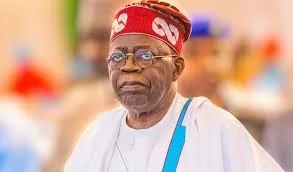
NIGERIANS KNOCK TINUBU ON FIRST YEAR IN OFFICE
Majority of Nigerian citizens are dissatisfied with the current state of affairs in the country, led by President Bola Ahmed Tinubu, according to a new survey by the Africa Polling Institute (API).
API’s Executive Director, Bell Ihua, said in a statement on Wednesday that the survey showed an overwhelming majority of citizens (84%) expressed profound sadness about the country’s current state of affairs.
The survey, titled “#NigeriaSpeaks,” conducted between May 1 and 18, 2024, included 3,996 respondents from various demographic groups across the country.
Ihua said the survey revealed a stark reality of hunger, poverty, and dissatisfaction—the harsh realities of Tinubu’s first year in office.
He stated that majority of citizens (81%) feel the country is headed in the wrong direction.
Specifically, 36% identify hunger, 28% identify the inability to meet basic needs, 13% identify unemployment, 9% identify heightened insecurity, and 5% identify poor electricity supply as the biggest challenges facing them personally today.
The survey, according to Ihua, disclosed that 74% of citizens affirmed that their personal economic situation has deteriorated over the last year, compared to 20% who said their personal economic situation had remained the same and a mere 5% who said it had improved.
In terms of Tinubu’s job performance, the survey also revealed that 78% of citizens expressed that he had performed “abysmally,” with 49% rating him “very poor” and 29% “poor.”
Ihua added that this dissatisfaction has also extended to the performance of other arms of government, with 81% of citizens rating Senate President Godswill Akpabio dismally, compared to 79% who rated Honourable Tajudeen Abbas, Speaker of the House of Representatives, poorly.
Also, the Nigerian judiciary under the CJN, Justice Olukayode Ariwoola, was not spared, as 75% of citizens also rated him poorly.
For Tinubu’s cabinet, citizens were asked to assess the performance of performing and non-performing ministers, and 68% said none of the cabinet members had performed well since their appointments, while 32% were willing to identify those they considered the top and least performing ministers.
Based on the responses, the survey said the top five performing ministers the people chose are Professor Tahir Mamman, the Minister of Education (27%); former River State Governor, Barr. Nyesom Wike, the Minister of the FCT (25%); former Ebonyi State Governor, Dr. Dave Umahi, the Minister for Works and Housing (21%); Dr. Bosun Tijani, the Minister of Communication, Innovation, and Digital Economy (14%); and Professor Ali Pate, the Coordinating Minister of Health and Social Welfare (12%).
While the least-performing ministers are Hon. Adebayo Adelabu, Minister of Power (44%); Dr. Dave Umahi, Minister of Works and Housing (30%); Hon. Wale Edun, Minister of Finance and Coordinating Minister of the Economy (27%); Hon. Heineken Lokpobiri, Minister of State for Petroleum Resources (22%); and Hon. Abubakar Kyari, Minister of Agriculture and Food Security (20%).
“It is worth noting that the data listed Dr. Dave Umahi among the top-performing and least-performing ministers, and this may be a result of the mixed sentiments that have engulfed conversations over the Lagos-Calabar Coastal Road project, of which he has been in the eye of the storm,” Ihua stated.“Finally, from the survey fieldwork, API has keenly observed a growing mass of aggrieved and discontented citizens nationwide, especially among the youth. Many are unemployed or underemployed and have become local crusaders and social activists in their communities, waiting for the slightest opportunity to vent their anger against fellow citizens and the Nigerian state.”

